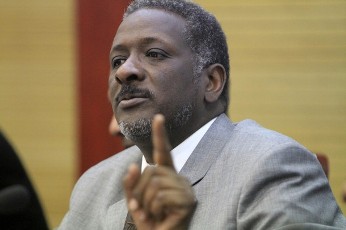Sudan’s finance minister to propose steps for redeeming budget
May 7, 2012 (KHARTOUM) – The Sudanese minister of finance and national economy Ali Mahmood Abdel-Rasool today promised the national assembly that next week he will outline possible steps that can be taken to make the 2012 budget sustainable.

Most notably, Sudan disagreement with landlocked South Sudan on how much should be paid for using the oil pipelines took away around $2.4 billion of revenue.
South Sudan decided to suspend oil production altogether this year when Sudan started taking some of the oil as payment in kind for outstanding transportation fees.
“Our losses from not reaching an agreement with South Sudan for using the pipeline are 6.5 billion Sudanese pounds, ($2.4 billion)” the minister told lawmakers.
Khartoum wanted the South to pay $36 a barrel including a “transit fee” and charges for using its marine terminal, transportation and processing, but the South proposed 70 US cents a barrel.
Abdel-Rasool said that his proposed plan would not include lifting fuel subsidies and boasted that there has not been any shortage in basic goods such as wheat, sugar and petroleum products.
Nonetheless he acknowledged the impact of political developments on the country and particularly the military clashes with South Sudan as well as battling rebels in the border state states of Blue Nile and South Kordofan which prompted a 13% increase in spending.
He also revealed that China Exports Bank stopped financing 11 ongoing developmental projects because of the absence of oil collateral which he said amounted to 120,000 barrels per day. None of that was paid to the Chinese since the oil-rich south became an independent state.
South Sudan’s oil represented more than a third of Khartoum’s revenues and its largest source of hard currency, leaving the government struggling for alternatives since independence.
A number of lawmakers fiercely criticized the government including former spy chief Salah Gosh who said that the only way out for the economy is encouraging and opening up the country for foreign investments.
But Gosh said that this approach will hit the wall of ruling party’s principles of seeking mobilization against being targeted by the outside world.
“If Sudan chooses this route then they have to walk it,” Gosh said.
Sudan has been subject to comprehensive economic sanctions since 1997 in response to in response to the Sudanese government’s alleged support for terrorism, destabilizing of neighbor governments and human rights violations.
Gosh also criticized the Merowe dam’s performance saying it has not produced the anticipated benefits.
The MP said the $2 billion Chinese-built Merowe dam failed to provide power to the nearby agricultural projects in the area and did not reduce industrial spending on electricity. He also wondered how many graduates were employed in the dam related projects.
The 1,250 megawatt project was completed in 2009 with the goal of doubling Sudan’s electricity supply.
Suad al-Fatih, another MP dismissed proposals to lift subsidies and said that finance ministry policies increased poverty levels among Sudanese which she claimed reached epidemic levels.
Abdullah Ali Massar, former information minister, accused some government ministries and namely the electricity ministry of keeping their revenues and are not transferring to the finance ministry.
Along with a weakening currency, Sudan has been struggling with soaring inflation, which jumped again in April to 22.6%, up from 22.4% the previous month, the central statistics bureau said on Monday.
Furthermore, the Heglig oil facilities in South Kordofan were badly dominated during the brief occupation by South Sudan forces.
But Sudan said the fields in Heglig, which produce half the country’s oil output, have resumed working though it is not clear at what capacity.
(ST)
